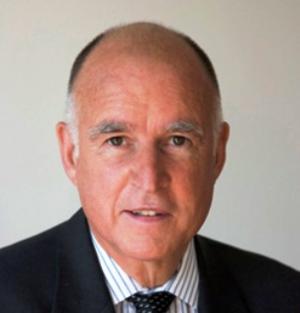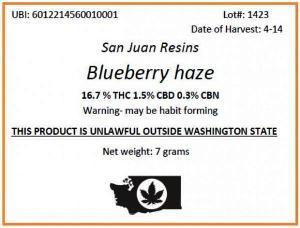In a move that cuts against more than a decade of sentencing reform efforts in California, Gov. Jerry Brown has vetoed a bill that would allow some people caught with small amounts of drugs to face misdemeanor charges instead of felonies.
Marijuana legalization could bring billions to the British government, two studies show. But there is little political will to move in that direction.
Our writer Phil Smith will be honored for his work on this newsletter in Denver next week.
Now more than ever, StoptheDrugWar.org needs your financial support to continue to provide this crucial informational tool that builds and empowers the movement. We have a special new offer for those donating $50 or more, which this post provides some updated information about.
Washington state's rules for legal marijuana commerce are now set. Look for some 300+ stores to open starting around the middle of next year.
The looming pullout of Western forces from Afghanistan could lead to an economic collapse and the strengthening of the country's opium economy, the UN anti-drug chief warned Wednesday.
An LA dispensary crackdown gets underway, an Arizona judge throws out a restrictive dispensary ordinance, the Michigan Supreme Court hears a dispensary ban case, and much, much more.
A new set of synthetic cannabinoid drugs are emerging, and the knee-jerk prohibitionist reponse -- Ban them! -- is kicking in.
The hemispheric winds of change around marijuana law reform are blowing on the Caribbean island nation of Jamaica, too. Lawmakers debated decriminalization there Tuesday.
While the conventional wisdom is to wait for 2016 for a California marijuana legalization initiative, some Californians aren't waiting. Now, a second legalization initiative has been filed.
A Tennessee meth lab raid leaves one man dead after attempting to flee in his vehicle.
A hard-partying Colorado cop calls it a career, a DC cop launders a bit of drug money, a North Carolina narc gets caught with her fingers in the jar, and a retired cop uses his old badge and cop plates to sling dope.
California Gov. Jerry Brown (D) Saturday vetoed a bill that would have allowed prosecutors or judges to charge simple drug possession as a misdemeanor instead of a felony. The bill would have made drug possession a "wobbler," meaning it could be charged either way, based on judicial or prosecutorial discretion.

overcrowded California prison (supremecourtus.gov)
Some 10,000 people are convicted of drug possession felonies each year in California, and experts estimated that, under the bill, 15% to 30% of them would have been charged instead with misdemeanors. The exact number is unknown because the bill would have left those decisions up to prosecutors and judges. But in any case, the bill would have resulted in hundreds of millions of dollars in criminal justice system savings, which would have provided local governments with more flexibility to invest in drug treatment and mental health services and focus law enforcement resources on more serious offenses, along with lightening up on some of the people caught up in the criminal justice system.
The bill, Senate Bill 649, was sponsored by Sen. Mark Leno (D-San Francisco) and passed the legislature with bipartisan support, but was opposed by law enforcement and some prosecutors. Leno and supporters had argued that the bill would save the state money on incarceration and related costs.
The bill was premature, given that a broader criminal justice system reform is in the works, Brown said in a veto message. "We are going to examine in detail California's criminal justice system, including the sentencing structure," he said. "We will do so with the full participation of all the necessary parties, including law enforcement, local government, courts, and treatment providers. That would be the appropriate time to evaluate our existing drug laws."
Even after the state's vaunted prison realignment, California prisons remain overcrowded, and the more than 4,100 people currently imprisoned on simple drug possession charges only add to that burden. The cost of imprisoning them comes to $207 million a year.
Under current California law, which will now stay in place, simple possession of drugs such as cocaine, meth, and heroin is a felony punishable by up to three years in prison. Leno's bill left that maximum sentence in place, but would have given either judges or prosecutors the discretion to punish possession as a misdemeanor, with a year in jail as a maximum sentence. Similarly, under the Leno bill, judges or prosecutors could have diverted drug users to treatment or community programs in a bid to reduce recidivism.
Charging drug possessors with misdemeanors instead of felonies would also have created criminal justice system savings with each lower-level prosecution. That's because felony charges require a preliminary hearing, while misdemeanor charges do not.
But law enforcement groups, including the California State Sheriffs Association, the California Police Chiefs Association, and the California District Attorneys Association all opposed the bill, labeling it a threat to public safety. They argued that the bill would reduce incentives for drug possessors to voluntarily seek drug treatment because they would only face jail time, and the jails are so full -- thanks to prison realignment -- that people sentenced to jail time do only a tiny fraction of that time.
Brown could have let the bill become law without his signature, Leno noted in an interview with the Chronicle earlier this month, and pronounced himself "surprised" at the veto.
"It's quite surprising that the governor would veto a modest attempt at sentencing reform in light of our prison overcrowding crisis," Leno said Saturday.
Bill supporters, including the ACLU of California and the Drug Policy Alliance lambasted Brown's decision to veto the bill.

Jerry Brown
"By vetoing SB 649,
Gov. Brown has thwarted the will of the voters and their elected representatives by rejecting a modest reform that would have helped end mass incarceration in this state," said Kim
Horiuchi, criminal justice and drug policy attorney for the ACLU of California.
"California voters and the legislature recognize the urgent need to reevaluate our sentencing laws and enact smart reforms, especially for low level, non-violent drug crimes," Horiuchi continued. "Doing so will allow California to reduce its reliance on incarceration and free up limited resources for the sorts of community-based treatment, education and job training programs proven to reduce crime and create safe and healthy communities. Despite this, Gov. Brown remains inexplicably opposed to meaningful sentencing reform."
"The governor let down the people of California, the majority of whom support going even farther than this bill would have gone," said Lynne Lyman, California state director for the Drug Policy Alliance. "The vast majority of voters agree with the experts -- locking up drug users is stupid, unproductive, cruel and expensive."
Despite the opposition of the law enforcement establishment, California public opinion wants to see sentencing reform. A 2012 Tulchin poll found that 75% of Californians preferred prevention and treatment as an alternative to jail for nonviolent offenders and 62% agreed that possession of small amounts of drugs for personal use should be a misdemeanor.
Thirteen other states and the District of Columbia already have such laws, and an effort to pass similar legislation is gearing up in Washington state. But in Sacramento, Gov. Brown was listening to the cops instead of the people.
"Our system is broken," said DPA's Lyman. "Felony sentences don't reduce drug use and don't persuade users to seek treatment, but instead, impose tremendous barriers to housing, education and employment after release -- three things we know help keep people out of our criminal justice system and successfully reintegrating into their families and communities."
back to top
special to the Chronicle by London-based Bernd Debusmann, Jr.
Hundreds of users of medical marijuana protested outside Parliament last Wednesday to demand changes to Britain's strict cannabis laws, a move many experts believe could yield billions of pounds in tax revenue and save the government billions in policing costs.
Under current law, it is illegal for British citizens to consume or possess cannabis.
Estimates vary on the financial impact of legalizing and taxing the drug, a longstanding proposal by reform advocates. A recent study by the Institute for Social and Economic Research found that the government would gain up to £1.25bn a year. A 2011 study by the Independent Drug Monitoring Unit found the amount could range from £3.4 billion to £9.5 billion per annum, with a best estimate of £6.7 billion per year based on current market prices.
Commenting on the protester's demands, Peter Reynolds of Clear UK, a Norwich-based organization which seeks to reform cannabis laws, said that both studies are likely underreporting the real potential value to the British government and taxpayer.
"All the estimates are based on self-reporting of cannabis use," he said, adding that people were reluctant to admit to what is a criminal activity under current law.
Reynolds added he believes that cannabis reform's potential economic benefits are currently outweighed by political considerations.
"Britain is obsessed with cannabis psychosis stories, so we cannot start talking about rational things like cost. There is not the same intelligent discussion going on as in the United States," he said.
This view was echoed by Rupert George, the head of communications for Release, an organization which lobbies for drug laws to be based on public health issues rather than criminal justice.
"There is far more entrenched 'reefer madness' than in the US, with the dominant issue being about psychosis," he said. "The idea of a regulated drug market for cannabis, or any other drug, is politically a long way away."
While the British government's official stance is that cannabis has no proven medicinal value, in March 2013 the government announced that Sativex -- a cannabis based mouth spray produced by GW Pharmaceuticals -- could be prescribed to multiple sclerosis patients.
Alan Pavia, a spokesman for NORML UK (a British affiliate of the US-based National Organization for the Reform of Marijuana Laws), which organized Wednesday's protest, said that the rescheduling of Sativex demonstrates the British government's double standards with regards to medical cannabis.
"Now GW Pharmaceuticals has a license to grow marijuana for Sativex. It would seem that Sativex is scheduled in a different manner to protect this company," he said.
Through a spokeswoman, Home Office Crime Prevention Secretary Norman Baker said simply that "the government has no plans to legalize cannabis."
Currently, ten EU countries and 20 American states allow for the medical use of marijuana. Some countries, such as the Netherlands, legally regulate the recreational use of the plant, while others, such as Portugal, have decriminalized possession. Two American states -- Colorado and Washington -- have legalized recreational use of marijuana.
back to top

Phil Smith, Kabul, Afghanistan, 2005
We are proud to report that Phillip Smith, the longtime writer and editor of this newsletter, is the 2013 recipient of the Edward M.
Brecher Award for Achievement in the Field of Media. The
Brecher Award is one of a set given by the
Drug Policy Alliance, at the biennial
International Drug Policy Reform Conference, meeting next Wednesday 10/23 through Saturday 10/26 in Denver, Colorado.
From the DPA press release, distributed late this afternoon:
The Edward M. Brecher Award for Achievement in the Field of Media has been awarded to Phil Smith. This award honors those who have produced the highest quality of journalistic coverage of drug policy and other drug issues.
Phil Smith has written more on the war on drugs than anyone else in the United States, if not the world. He has served as writer and editor of the Drug War Chronicle newsletter since May 2000, where he has turned out 6,500 hundred separate articles and 1,500 feature stories. He was the first to break the news about California's then-Governor Schwarzenegger signing a marijuana decriminalization bill as well as many other notable drug policy headlines. He has reported from the opium fields of Afghanistan and the coca fields of Bolivia and Peru, as well as the US-Mexico border and the mean streets of North American cities from Vancouver to Washington, DC.
Others awardees this year include the Seattle Police Department, organizers of the Colorado and Washington marijuana legalization initiatives, the Portugal government's drug agency, the Global Commission on Drug Policy, and more.
The full release, with complete list of honorees, is online here.
back to top
Dear friend of drug policy reform,
StoptheDrugWar.org needs your support more than ever before to continue our work of getting the word out online for the drug policy reform movement, building the movement, and providing this crucial informational tool that reformers around the world use in their work every day. I ask your support at this time with the most generous donation you can afford to enable this newsletter to continue.
In recent weeks we've announced our latest offer for members donating $50 or more, author-signed copies of three important new books. Phil has now completed reviews of all three of these works, most recently NYT bestselling author Doug Fine's -- Too High to Fail: Cannabis and the New Green Economic Revolution, as well as Marc Mauer and Sabrina Jones's Race to Incarcerate: A Graphic Retelling and Carl Hart's High Price: A Neuroscientist's Journey of Self-Discovery That Challenges Everything You Know About Drugs and Society.
To donate, and to order any of these or other items we offer, please use our online donation form at http://stopthedrugwar.org/donate, or scroll down for info on donating by mail. We are asking donations of $50 or more for a signed copy of any one or these books, $95 or more for signed copies of any two, or $135 or more for signed copies of all three. (If more than 25 people order the books by the time you place your order, we will ask the authors if they're willing to sign more. If that can't be worked out, we'll contact you and offer to make different arrangements, whether for a full or partial refund or to send different items.)
Now, $50 is a little more than we've asked for such items in the past, and of course they can be ordered online or purchased in a bookstore for less. Things have changed in the drug reform funding scene, making our organization more dependent on membership to continue our programs -- I hope you'll choose to support us at this time. Note that we continue to offer a range of books, videos, and StoptheDrugWar.org gift items with donations of as little as $7 -- visit our donation form to see the full list.
Also note that donations to StoptheDrugWar.org can be tax-deductible, supporting our educational work, or non-deductible, supporting our lobbying work. (Note that selecting any gift items reduces the amount of your donation that is deductible -- which with a smaller gift amount can be most of it.) Donations can be made by credit card or PayPal at http://stopthedrugwar.org/donate, or sent by mail to P.O. Box 18402, Washington, DC 20036. If you are donating by check, please make it payable to DRCNet Foundation (if tax-deductible) or Drug Reform Coordination Network (if not deductible). If you wish to donate stock, the information to give your brokerage is Ameritrade, (800) 669-3900), DTC#0188, and account number 781926492 for tax-deductible gifts or 864663500 for non-deductible gifts -- please make sure to contact us if donating in this way.
Thank you for standing with us to stop the drug war's cruelties and meet the opportunity this time offers to make a brighter future. As recent events show, time and the truth are on our side!
Sincerely,

David Borden, Executive Director
StoptheDrugWar.org
Washington, DC
http://stopthedrugwar.org
back to top
Washington became the second state to adopt rules and regulations for legal marijuana commerce Wednesday, as the state Liquor Control Board (WSLCB) finalized its proposed rulemaking process. Colorado, which also legalized marijuana in the November 2012 elections, completed its rulemaking process several weeks ago.

Legal, regulated, labelled marijuana is coming soon to Washington (lcb.wa.gov)
"We feel very proud of what we're doing," said
WSLCB chairwoman Sharon Foster. "We are making history. Over these last several months we have put together a comprehensive system of rules which will serve as the foundation for this new industry. This has been a very open process of rulemaking with public involvement each step of the way. We appreciate all the support and involvement we've had from
Gov.
Inslee, local officials, law enforcement, industry members and Washington citizens along the way."
The WSLCB was tasked with balancing the need to make marijuana easily accessible enough to choke off the black market, while not making it so easy to get that it will leak out of state, get into the hands of minors, or otherwise pose a public health threat.
The rules cover all aspects of marijuana commerce and regulate it from seed to retail sale. They will allow up to 334 marijuana retail stores, with sales expected to begin around the middle of next year. Supporters hope marijuana sales will generate tens or hundreds of millions of dollars in tax revenues, with much earmarked for public health and drug abuse prevention.
In a bid to prevent monopolization of the industry, the WSLCB is limiting the number of licenses anyone can hold to three. It also bans out of state investment in marijuana businesses.
Things will really get down to business next month, when the board opens a 30-day licensing window for producers, processors, and retailers. That begins on November 18.
back to top
Afghanistan could collapse into a "full-fledged narco-state" as the looming withdrawal of US and NATO combat forces creates a gaping hole in the center of the country's economy, Yuri Fedotov, the head of the UN Office on Drugs and Crime (UNODC) warned Wednesday.
In an interview with
Reuters,
Fedotov noted that the Western forces generate about a third of all jobs and investment in Afghanistan. They are due to leave the country by the end of next year, and even the presence of a residual force of up to 10,000 fighters is increasingly in doubt as the US and Afghan haggle over a status of forces agreement that would allow them to stay.
The other major economic activity in the country is opium production, processing, and distribution, including the manufacture of heroin from raw opium, which accounts for roughly another third of the national economy. Since the US invaded Afghanistan in October 2001, it has consistently been the world's leading source of illicit opium production, accounting for nearly 90% of all poppies produced worldwide.
Multi-hundred million dollar annual cash flows associated with the opium economy have benefited the Taliban insurgency, which taxes farmers in areas it controls as well as engaging in or protecting drug trafficking. They have also benefited corrupt Afghan government officials and associated warlords.
Fedotov, whose native Russia has been flooded with Afghan heroin, said Wednesday that an upcoming UNODC survey due later this month will show increases in both opium cultivation and production.
"The situation is worsening, that is clear and very disappointing," he said. "It is a very serious setback, but we need to take that as a warning shot," he added, calling for increased international assistance.
"That is also fertile ground for corruption and other forms of transnational organized crime. It is a multi-faceted challenge and we need to take that as a serious problem," Fedotov warned. "Otherwise we have a serious risk that without international support, without more meaningful assistance, this country may continue to evolve into a full-fledged narco-state," he said. "We have not been able to develop an alternative economy in Afghanistan," Fedotov said. "With all our efforts, it was very hard to move from illicit to licit."
Oh, and those Afghan farmers? When they're not producing opium, they're producing cannabis. Afghanistan is also one of the world's preeminent producers of it, according to UNODC, and production was up again last year, the group reported last month.
back to top
An LA dispensary crackdown gets underway, an Arizona judge throws out a restrictive dispensary ordinance, the Michigan Supreme Court hears a dispensary ban case, and much, much more. Let's get to it:
ArizonaOn Monday, a Superior Court judge overturned Maricopa County's restrictive dispensary ordinance, ruling that it was a "transparent attempt" to bar the businesses from unincorporated areas of the county. The judge granted a pretrial verdict in favor of White Mountain Health Center, which seeks to open a dispensary in Sun City. While the county has the power to zone to protect public health, safety, and welfare, it cannot categorically deny permits to dispensaries, he ruled.
California
Last Tuesday, Berkeley police and city inspectors raided the Forty Acres collective to look for code violations. The raid came two weeks after Forty Acres filed a lawsuit against the city and its Medical Cannabis Commission in a longstanding dispute over the dispensary's efforts to ensure its legality. The suit charges the city with discrimination and denial of due process. City officials, who have been trying to shut the place down since December 2011, maintain that it is a collective operating in a commercial district, which violates the city's zoning laws. Collectives are supposed to operate in residential areas and be "incidental" to the rest of the house.
Last Friday, Los Angeles officials said 38 dispensaries are being prosecuted and another 40 have shut down voluntarily after receiving warnings to close their doors. This is the beginning of the city's effort to enforce Measure D, a May ballot initiative that capped the number of dispensaries at 135. There are an estimated 800 to 1,000 dispensaries in the city. About 800 received letters warning them they aren't legal. Some of them have joined together to challenge the law in court.
On Tuesday, the Yorba Linda planning commission approved an ordinance banning dispensaries and cultivation centers. The only dispensary to operate in the city was forced to close in February 2010. No one showed up to testify on either side of the issue. Yorba Linda, a community founded by Quakers, also does not have a single bar within city limits, although in recent years, it has allowed alcohol to be sold in restaurants.
Connecticut
On Tuesday, the Fairfield Plan and Zoning Commission voted to deny two dispensary applications. The unanimous vote came after two public hearings. The commission said it denied the application not out of opposition to medical marijuana, but because the town did not have regulations in place. Some commissioners said they needed to move forward with regulations, and that the state needed to get more deeply involved.
Massachusetts
On Tuesday, the town of Saugus approved a moratorium on dispensaries. The moratorium will be in place at least until next September. The town maintains that the moratorium will allow town boards, committees and officials an extended period of time to study the possible legal, land use, public safety and public health impact of a local dispensary on the town and make recommendations for Town Meeting approval.
Michigan
Last Thursday, the state Supreme Court heard oral arguments on the town of Wyoming's ban on dispensaries. The town's 2010 law barred any activity that conflicts with federal law, but that law was struck down by a lower court. The town then appealed with the support of an association of Michigan prosecutors.
Oregon
Last Wednesday, medical marijuana supporters picketed the Good Samaritan Regional Medical Center in Corvallis. Patients and supports complained that they are getting unfair treatment from the hospital's parent company, Samaritan Health Services, the largest health care provider in the mid-Willamette River Valley. Patients were especially incensed over efforts to force them to choose between opioid pain medications and medical marijuana.
Late last month, the city of Medford began revoking business licenses for dispensaries. The city says the businesses do not comply with federal law, even though the Oregon legislature this year passed a dispensary bill and the federal government has signaled a largely hands-off approach. The move came after the city council unanimously approved and expanded an ordinance that had previously only said businesses had to be conducted in a lawful manner. Patients and supporters are mobilizing.
[For extensive information about the medical marijuana debate, presented in a neutral format, visit MedicalMarijuana.ProCon.org.]
back to top
Florida Attorney General Pam Bondi Wednesday filed an emergency rule criminalizing four related synthetic cannabinoid drugs, including one being marketed under the name "Crazy Clown," her office announced in a press release. The emergency move makes the new synthetics Schedule I controlled substances under Florida law.
The four substances are
B-PINACA,
AB-FUBINACA,
ADB-PINACA, and
Fluoro ABDICA. They have been tentatively identified as
cannabinoid receptor
agonists, similar to an earlier round of synthetic
cannabinoids that have been marketed under names such as "Spice" and "K2." Those drugs are banned under federal law and are illegal in a number of states as well.
Georgia banned the drugs last month under a synthetic drugs analog law, and now neighboring Florida has moved to do so, too.
The move came after a spate of media reports and law enforcement warnings in August and September about users suffering ill effects from "Crazy Clown," including nausea, vomiting, and violent behavior. But there has been no reported follow-up on those initial accounts.
"I will remain vigilant in my efforts to keep these drugs off store shelves and will continue to outlaw emergent synthetic drug compounds. These drugs pose a serious threat to Floridians, particularly our youth," said Attorney General Bondi.
"While synthetic drugs are marketed as safe alternatives to illegal drugs, make no mistake; these synthetics are dangerous," said Florida Department of Law Enforcement Commissioner Gerald Bailey. "Adding these four new concoctions to Florida's schedule 1 drug list strengthens our fight. We will continue our efforts with Attorney General Bondi to identify illegal chemicals and react swiftly."
Bondi said she will work with the state legislature to permanently ban them next year.
While Bondi's action is of a piece with the reflexive prohibitionist response to the earlier new synthetics apparent both in Washington and in state houses around the country, banning new synthetic drugs is not the only possible response to them. New Zealand made headlines worldwide when instead of banning them, it moved to regulate new synthetics.
back to top
Lawmakers in Kingston Tuesday debated marijuana decriminalization, even though there is no bill pending or vote scheduled. The move came as the evergreen issue of marijuana law reform picks up momentum in the home of reggae and Rastafari, with other Caribbean and nearby island nations and US states contemplating similar pot law changes.
Marijuana decriminalization or legalization has been a topic of discussion in Jamaica for decades, but no governments have moved beyond the talking stage. As the winds of change blow across the hemisphere, however, pressure for reform is mounting.
In Tuesday's debate, lawmakers complained that young men are getting criminal records for possession of ganja at the rate of 300 a week. Those criminal records lessen those people's job prospects, the lawmakers said.
"There is no doubt that ganja can have harmful effects on an individual. But this does not warrant criminalization of thousands of Jamaicans for their personal choice and use, some for reasons deep-rooted in culture," opposition Jamaica Labor Party lawmaker Daryl Vaz, a former information minister, said in remarks reported by LinkUpRadio.com.
"For personal use, the punishment of a criminal record is too much," agreed People's National Party (PNP) Minister of State for Tourism & Entertainment Damion Crawford, the son of a Rastafarian. Too many Jamaicans suffer the consequences of those criminal records for ganja, he added.
The debate came after a PNP lawmaker, Raymond Pryce, filed a motion to open discussion. Pryce argued that the plant has long been a part of Jamaica's history despite being prohibited in 1913. Pryce said that there was great commercial and medicinal potential in the plant. The plant has long been used medicinally as well as recreationally by rural Jamaicans, and is considered a sacred sacrament by Rastafarians.
More than a decade ago, a government-appointed commission recommending decriminalizing the possession and cultivation of small amounts of pot, saying the herb was "culturally entrenched" in the county, but that recommendation went nowhere in the face of fears of angering the US. Now, with two US states having already legalized marijuana and more getting in line to do so, the fear of dire reaction from Washington has largely dissipated.
back to top
And then there were two. Proponents of a second 2014 marijuana legalization initiative filed the measure with the California secretary of state's office last Friday. An earlier 2014 legalization initiative has already entered the signature-gathering phase.
The measure filed last Friday,
the Marijuana Control, Legalization and Revenue Act of 2014, would legalize, tax, and regulate marijuana possession, cultivation, and sales. It would also allow adults to grow up to 100 square feet of marijuana each -- provided they have the permission of the property owner and the grow is fenced.
The measure explicitly protects the rights of medical marijuana users, stating that it "shall not affect the individual and group medical rights and protection afforded" under Proposition 215 and subsequent legislation.
It would create a California Cannabis Commission with enumerated powers to regulate and control commercial marijuana cultivation and sales. Commission members could not include people currently holding state or local elected office or people who have been involved with a marijuana business in the past two years. The commission must include an attorney, an accountant, a member of law enforcement, a small business owner, and a member of the public at large.
The initiative touts itself as the first "open source" California legalization initiative and was largely drafted through an online consultative process by veteran activists. It must now have its title and ballot summary approved by the state attorney general's office, which has 60 days to do so, and if approved, signature-gathering can then commence.
Under California initiative law, measures approved for signature-gathering then have 150 days to collect signatures. This year, they need 504,000 valid voter signatures to make the ballot.
The Hererite perennial California Cannabis Hemp Initiative, which would also legalize marijuana in the state, has already entered the signature-gathering phase and has until February to come up with sufficient signatures.
The conventional wisdom among initiative experts and marijuana reform backers is that the huge number of signatures required to make the ballot in California necessitates paid signature gatherers and a budget of at least a million dollars. And that's just to make the ballot. Actually winning an election would likely cost several million dollars more.
The conventional wisdom is also calling for California to hold off until the 2016 presidential year, when expected higher turnout is believed to boost prospects for victory. But some Californians clearly aren't waiting. The question is whether this will turn out to be a repeat of 2012, when multiple legalization initiatives sought to make the ballot, but, lacking funds and unity, none did.
back to top
Sullivan County sheriff's deputies shot and killed a man attempting to flee in a vehicle Friday night as they conducted a raid on a residence where a meth lab was suspected to be operating. Kenneth Ray Clark, 47, becomes the 33rd person to die in US domestic drug law enforcement operations so far this year.
According to the
Bristol Times-News, citing police sources, officers with the Sheriff's Office Vice Unit, the
1st Judicial Drug Task Force, and the Tennessee Methamphetamine Task Force were dispatched to a Bristol residence after receiving information that a meth lab was operating there and that a person with outstanding warrants was there.
Upon arriving at the property, officers found Clark in a vehicle. Police said he refused to get out of the vehicle and, in an attempt to flee the scene, "tried to run over at least two officers." Officers then opened fire on the vehicle, striking Clark. Clark managed to drive approximately a mile, where police found him dead in his vehicle.
Clark was wanted on a probation violation warrant in Sullivan County. He also reportedly had an unspecified outstanding warrant from nearby Bristol, Virginia.
Although Clark allegedly "tried to run over at least two officers," there was no mention of any injury to any of the officers involved.
The shooting will be investigated by the Tennessee Bureau of Investigation.
back to top
A hard-partying Colorado cop calls it a career, a DC cop launders a bit of drug money, a North Carolina narc gets caught with her fingers in the jar, and a retired cop uses his old badge and cop plates to sling dope. Let's get to it:
In Littleton, Colorado,
a Littleton police officer resigned Monday as he prepared to plead guilty to charges related to his purchase of $1,300 worth of Ecstasy from a confidential informant in July. Jeffrey Allan Johnston, a 22-year veteran of the department, was also accused of holding parties in his home, where investigators found cocaine, steroids, prescription pills by the hundred, cash, and guns. He is expected to plead guilty to one count of prohibited person in possession of a firearm and one count of possession with intent to distribute. His court date is set for October 28.
In Washington, DC, a DC Metro police officer was arrested last Friday on charges she helped to launder drug money. Officer Stephanie Ellison, 49, went down for allegedly conspiring to buy high-end sports cars and a Harley Davidson motorcycle with drug proceeds in a bid to conceal the money. She's looking at up to 20 years in federal prison, but for now remains on administrative leave with pay.
In Greenville, North Carolina, a former Greenville narcotics detective pleaded guilty last Thursday to three counts related to stealing thousands of dollars in drug money seized during investigations she conducted. Rose Edmonds copped to three counts altering, destroying, or stealing evidence. She was fired after being arrested in February. She was sentenced to at least six months in prison on each count, with the sentences to run consecutively, but the judge suspended her sentence unless she misbehaves anew.
In Norristown, Pennsylvania, a retired Norristown police officer was sentenced last Thursday to at least 17 years in prison for selling meth and prescription pills and using his old police badge and license plate as cover. Jack Pennington, 68, had pleaded guilty to 16 of 21 drug-related felonies after becoming the subject of an investigation by the Montgomery County Narcotics Enforcement Team. He went down as he went to meet his supplier at a local mall. Although he had retired at the time of his offenses, in our view, his use of his old police badge and plates qualifies him for mention here.
back to top













